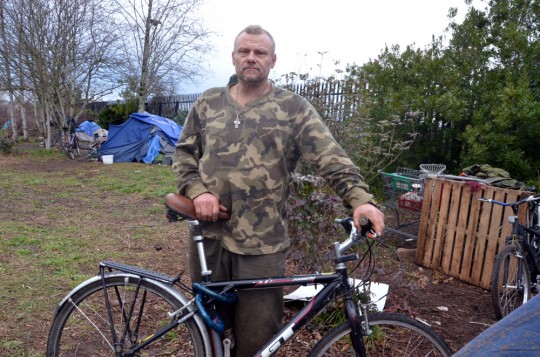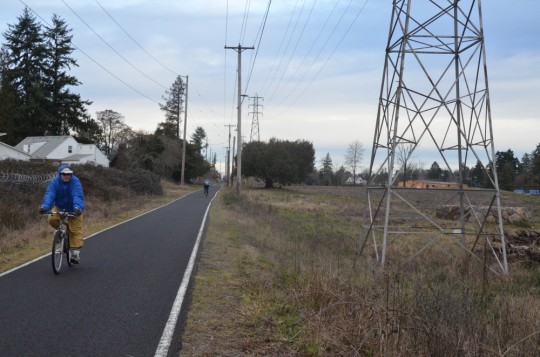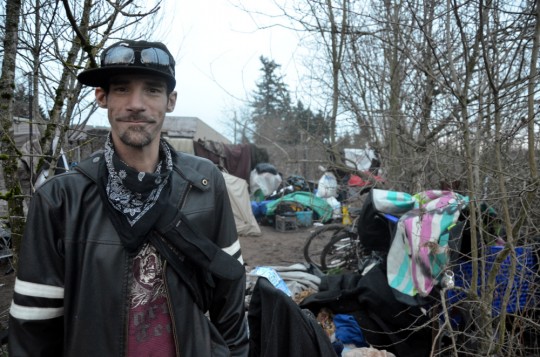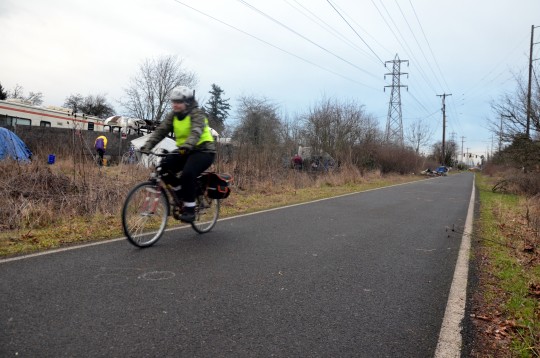
(Photos: M.Andersen/BikePortland)
Last week’s post about a number of people living in tents and outside along the Springwater Corridor near 82nd Avenue has sparked a lot of discussion, but one big thing was absent from it: the perspectives of people actually living there.
“Most people out here are really good people. … It only takes a few bad apples to spoil the bunch, right?”
— Josh Hagg, who lives amid a cluster of tents adjacent to the Springwater path east of 82nd.
So on Monday, to learn more about the situation that has led some people to avoid biking on this major corridor at night, Jonathan and I decided to see what some of the people staying along the trail think about the complaints we’ve heard.
Right now there are maybe a couple dozen people, mostly men living solo in tents, along the Springwater on both sides of 82nd Avenue (this is the section of the path adjacent to the Cartlandia food cart pods). There was a couple or two and, I was told, one family with kids.
I went by around 4 p.m. Monday to talk to several of them about how they got there, what it’s like to live along the corridor and the relations between people using the corridor and people sleeping near it.
Here’s what they said.
Mohawk Craig
The man who gave his name as Mohawk Craig was standing with his bike next to his tent when I arrived, just across the path from the Cartlandia food cart pod west of 82nd. When I told him I worked for a blog about biking, his first reaction was to tell me that a pothole had opened up nearby and that he’d almost wiped out on it.
“I’m a vet and trying to get into housing… Some people aren’t here by choice, you know what I’m saying?”
— Mohawk Craig
Of the five people I talked to living outside, Craig was most likely to start saying things I couldn’t follow, but most of what he said was straightforward enough.
Craig said he’s been living in the area off and on since summer, minus some time in a “recuperation” home after a medical procedure.
“I’m a vet and trying to get into housing,” he said. “They want you to jump through a bunch of hoops. I gotta get on the ball on that. Right now I’m helping take care of these people. … Some people aren’t here by choice, you know what I’m saying?”
Craig said that some people on the trail, including himself, try to clean up after themselves and their neighbors, but some people don’t.
“Sometimes people dig into a bunker or whatnot,” he said. “Some people take it way overboard. That down there [he waved eastward] they need to go to jail.”
I told Craig that some people aren’t comfortable using the Springwater right now. He seemed to understand that.
“There’s freaks anywhere you go,” he said. “It ain’t everybody.”
“It’s the same on the other streets that it is walking down the trail,” he said. “It’s worser on the sidewalks.”
Craig said he had called the police once when there were some “dudes picking fights” and a man who he said was drunk jumped the Cartlandia fence and “started bashing in windows.”
Though Craig clearly thought that was wrong and stupid, he also mentioned that homeless people’s property had been bashed in, too.
“The cops came through here and they tore the shit out of this place two to three weeks ago,” he said.
Craig said he thinks there should be more space designated for long-term camps.
“Like, that big field out there, we could put up some boards to make it nice,” he said, gesturing south. “There’s a lot of places, you know. Give a spot. Give an area.”
Short of that, he’d like to have somewhere to poop.
“See, like this guy up there taking a piss,” he said as a man 50 feet away walked a few feet uphill from his tent to face the fence. “Where else is he supposed to go?”
Josh Jones
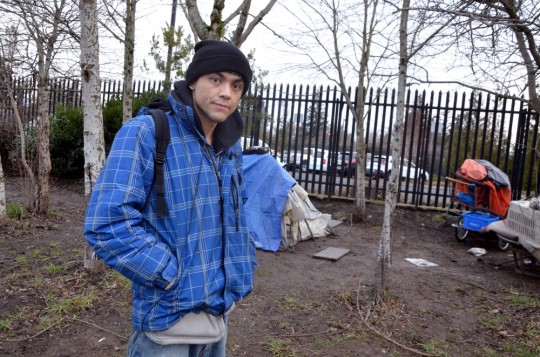
Jones said he’s 29, originally from Tacoma, and living in Portland because his biological father (who he didn’t know because he grew up in the foster care system) lives near Harney Park.
He said he’s been living on the Springwater for “six years on and off” because, in that time, his father had kicked him out “35 or 40 times.”
Like Craig, Jones said he spends a fair amount of time each day picking up garbage around his tent and his neighbors’.
“As you see, mine is probably the cleanest tent you’ve seen here,” he said. “As long as we’re not making a disturbance to the neighborhood, as long as we keep it tidy and aren’t loud at night time, pretty much people are OK with us.”
Advertisement
I asked Jones why he thought people were living in tents. “The economy — people losing their jobs,” he said. “Natural course, I guess.”
I told him some people don’t feel safe biking on the Springwater, and asked what he thought of that.
“Overreacting,” he said. “I’ve never seen a violent encounter around me since I’ve been out here.”
He also said he wasn’t aware of any recent police bust.
“There’s still lots of good people out here, actually,” he said. “It doesn’t happen to everybody, I guess. … As I usually say, it happens to the best of us.”
Sherry D (not pictured) and Luis Solorio
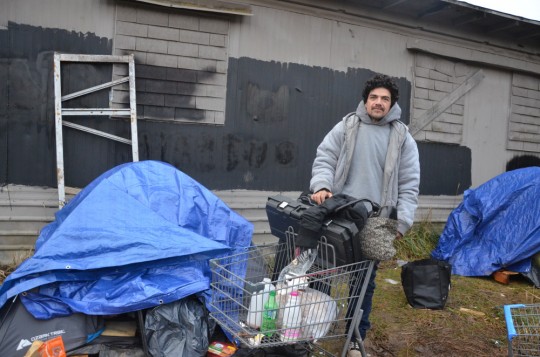
Both Mohawk Craig and Jones had told me that the bigger camps were east of 82nd, so I headed there. There were a similar smattering of tents and shopping carts, some with piles of garbage around them, plus a couple bedrolls (I think) in the open when I got there.
“Sometimes I don’t even want to come out of jail because I know this is what I am going to come out to.”
— Luis Solorio
Sherry D and Solorio had set up camp along the back of a shed, about 25 feet up a muddy trail from the path. They were sitting outside when I got there.
I asked what brought them to live here.
“Pretty much not being able to keep a job because of my addiction,” Solorio said. “If I’m not out there, I’ve been in jail. … It’s been like that for the last two years.”
“Sometimes I don’t even want to come out of jail because I know this is what I am going to come out to,” he said.
“Every day I wake up and the first thing I think is: How much [heroin] do I have? And am I going to flip this trick and is that going to be enough to keep me well?”
— Sherry D
I asked the couple whether they think the Springwater camps could be solved through some general public action or whether it just comes down to a collection of personal problems for the people there.
“I think it’s personal,” said Solorio.
Sherry D agreed.
“All this is because everyone has addictions, that’s what it is,” she said. “Everybody out here has addictions. Maybe not all.”
Sherry D said she has a job at a bakery and also works side gigs; last weekend she installed carpet at an auto shop. She said she makes enough money not to be homeless but has been using drugs since age 11. She currently uses heroin, and said she spends almost all her money to feed that addiction.
“Every day I wake up and the first thing I think is: How much do I have? And am I going to flip this trick and is that going to be enough to keep me well?” she said.
They said their addictions have led to problems that have then made it harder to get their lives in better order.
“I didn’t pay my phone bill,” Sherry D said. “Too busy buying heroin.”
Solorio said he’d been working for the taco truck in Cartlandia until one of Cartlandia’s owners found out that he was homeless. At that point, Solorio said, the man 86’d him from the property, effectively firing him. He said he asked what he’d done but didn’t get an answer.*
I told them that some people don’t feel safe using the Springwater. Sherry D didn’t seem surprised but she did seem puzzled.
“What exactly is it that they have a problem with?” she asked.
I asked the two if they ever felt personally unsafe because of other people camping or police or anyone else.
“Everybody knows me, so no one will fuck with me,” Sherry D said. “So I guess I feel safe.”
Solorio corrected her.
“Everybody knows us,” he said. She nodded, seeming to agree.
Josh Hagg
A bit east of 82nd and north of the path is the largest cluster of tents, about six or seven, tucked behind some bushes around a small common area. I wondered if it was the spot Mohawk Craig had been calling a “bunker.” Most but not all of the men staying there when I arrived seemed to be in their 20s or 30s. I asked if I could interview someone.
“If people are hurting your community or family, I think you should tell them to leave — they’re bad.”
— Josh Hagg
Two men came over but Hagg was the one who talked to me longest. He said he is 37 and has been living outside for seven years. Hagg also painted by far the rosiest picture of the situation, which he said has been changing for the better.
“It seems like the community is coming together,” he said. “Last year it’s been getting a lot better. … Just people coming together, working it out for each other.”
I told him that some people don’t feel safe using the Springwater and asked if he thought there were troublemakers there.
“There’s probably just like a couple,” he said. “Most people out here are really good people. … It only takes a few bad apples to spoil the bunch, right?”
Hagg said he thinks the solution to problems like that is to drive troublemakers away.
“If people are hurting your community or family, I think you should tell them to leave — they’re bad,” he said. “Folks who are in a house, people who are outside, everybody should come together on that, if someone is being wrong. Everybody wants the same thing, they’re just having a hard time talking together.”
I’m not sure about the rest of what Hagg said, but that much, at least, definitely seems to be the case.
*Cartlandia owner Roger Goldingay says Solorio was not excluded from his property because he lives outside. Goldingay says he witnessed Solorio committing a crime while on the job.
— Michael Andersen, (503) 333-7824 – michael@bikeportland.org

